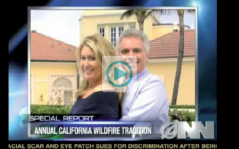Public Journalism
Printed Page 405
From the late 1980s through the 1990s, a number of newspapers experimented with ways to involve readers more actively in creating news. These experiments in what has become known as public journalism surfaced primarily at midsized daily papers in Kansas, Minnesota, and North Carolina. Davis Merritt, editor and vice president of the Wichita Eagle, one paper that conducted such experiments, described public journalism with these words:
VideoCentral  bedfordstmartins.com/ mediaessentials
bedfordstmartins.com/ mediaessentials

Fake News/Real News: A Fine Line
The editor of the Onion describes how the publication critiques “real” news media.
Discussion: How many of your news sources might be considered “fake” news versus traditional news, and how do you decide which sources to consult?
- It moves beyond the limited mission of “telling the news” to a broader mission of helping public life go well, and acts out that imperative. . . .
- It moves from detachment to being a fair-minded participant in public life. . . .
- It moves beyond only describing what is “going wrong” to also imagining what “going right” would be like. . . .
- It moves from seeing people as consumers—as readers or nonreaders, as bystanders to be informed—to seeing them as . . . actors in arriving at democratic solutions to public problems.8
Public journalism emerged as a way to involve citizens and journalists more centrally in civic and political life. Newspaper editors and reporters interested in addressing citizen alienation—and reporter cynicism—began devising ways to engage both groups in conversation about the news. To draw the public into discussions about community priorities, these journalists began sponsoring forums where citizens were invited to have a voice in the news that directly affected them. Reporters then published stories framed from the citizens’ perspectives and created citizen task forces to keep the conversation going about the issues most important to the community.
Public journalism did not directly transform the industry, but an extension of the movement, citizen or community journalism (see Chapter 3), has changed the role of some in the news audience from readers and viewers to actual participants in journalism. As members of a grassroots movement, activist amateurs and concerned citizens use the Internet and blog sites to disseminate news and information. In fact, with devastating cutbacks in newsroom staffs in recent years, many professional news organizations are now using some of their readers/viewers and prominent community citizens to do work that journalists used to do.